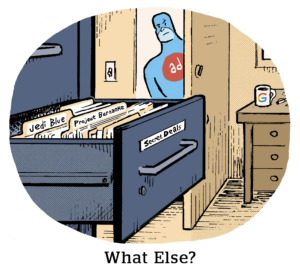Here’s today’s AdExchanger.com news round-up… Want it by email? Sign up here.
What’s In Store?
The biggest grocery chains with sophisticated retail media businesses have already harvested the low-hanging fruit of advertising. They have on-site and off-site supply, channel partnerships, self-serve and managed service offerings, and they’ve effectively converted most old-school shopper marketing budgets to the retail media business.
Walmart raced out to $2 billion in ad revenue when it first reported the metric in 2022. To keep growing, though, Walmart must earn non-endemic revenue from brands it doesn’t carry in stores.
Even for the biggest retailers, the non-endemic baby steps are just that. Walmart, for instance, will soon begin showing CTV ads for auto, QSR, insurance and other brands not sold at Walmart, but the ads will appear on in-store screens, Adweek reports.
Amazon already has a massive business beyond its dot-com spanning Twitch, Fire TV and Prime Video. So it’s on to the next next frontier, which is to win over the American every-business. Amazon is trying to catch up with the fact that every company, organization, individual who sells stuff out of the back of a truck, you name it, has a business account on Google and Meta, which greatly buttresses those platforms’ demand. And Amazon is making its case to be included, too.
Turn Of Events
Splashy marketing industry events are being traded around this month.
First there was news Wednesday that Ascential, which throws the Cannes Lions festival, was acquired by the British publishing and events business Informa.
The latest news comes from Hyve Group, a B2B events company that does ShopTalk and FinTech Meetup, among others. Hyve acquired Possible, a marketing conference in Miami that threw its second-ever event this year.
Terms were not disclosed, though Digiday reports the deal valued the conference and IP at about $40 million.
Possible had an unusual business approach, compared to other B2B media and events startups. The company began by cutting in many prominent industry workers as advisors and angel investors. For example, Terry Kawaja, LUMA CEO and ad tech investment banker, was an investor. As was Aperiam, a VC fund backed by the ad tech entrepreneurs, led by Eric Franchi and Joe Zawadzki. Michael Kassan, former CEO of MediaLink, which was acquired by Ascential, is chairman of Possible’s ownership group, while Deborah Wahl and John Costello, former CMOs of GM and Dunkin’ Donuts, respectively, were investors and remain on the board.
¡Qué KOSA!
The Senate advanced two bills to strengthen kids’ online data protections: the Kids Online Safety Act (KOSA) and an update to the Children and Teens’ Online Privacy Protection Act (COPPA 2.0).
But while the Senate will vote this week, pundits say neither bill is likely to pass this year, The Hill reports.
Even if both bills pass the Senate, the House still must vote, and it’s in recess until September. Also, passing landmark legislation during a contentious election is traditionally a nonstarter. (Nobody will deliver a win for their opponents.)
There are strange bipartisan allegiances for both bills, with only Sens. Rand Paul and Ron Wyden standing out in opposition.
And the ACLU and several LGBTQ+ civil rights groups join some conservatives in opposing KOSA – the ACLU maintains the language could be used to censor LGBTQ+ content and creators. Sen. Marsha Blackburn, one of KOSA’s biggest boosters, promotes the law as a way to protect “minor children from the transgender in this culture.”
Plans to mark up a House version of KOSA fell through last month. And Reps. Alexandria Ocasio-Cortez and Frank Pallone reportedly oppose its current form.
But Wait, There’s More!
SSPs shake up fee structures for publishers that use SPO or curated demand services. [Adweek]
An asbestos lawyer’s new crusade: suing social media companies. [The Information]
TikTok goes all in on Washington, DC, with its US survival at stake. [Bloomberg]
EssilorLuxottica shares climb after eyewear giant draws Big Tech interest in making smart glasses. [WSJ]
















